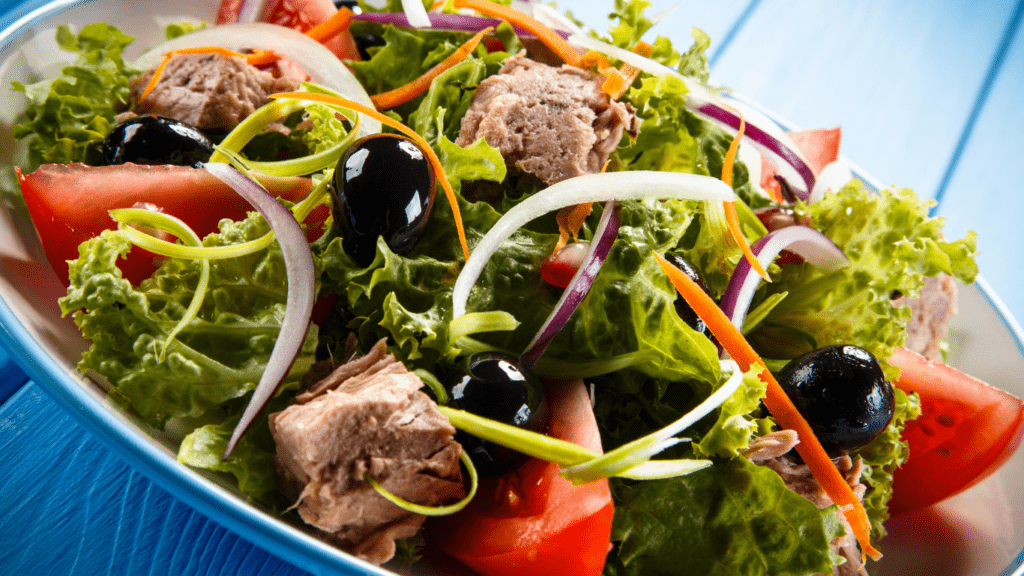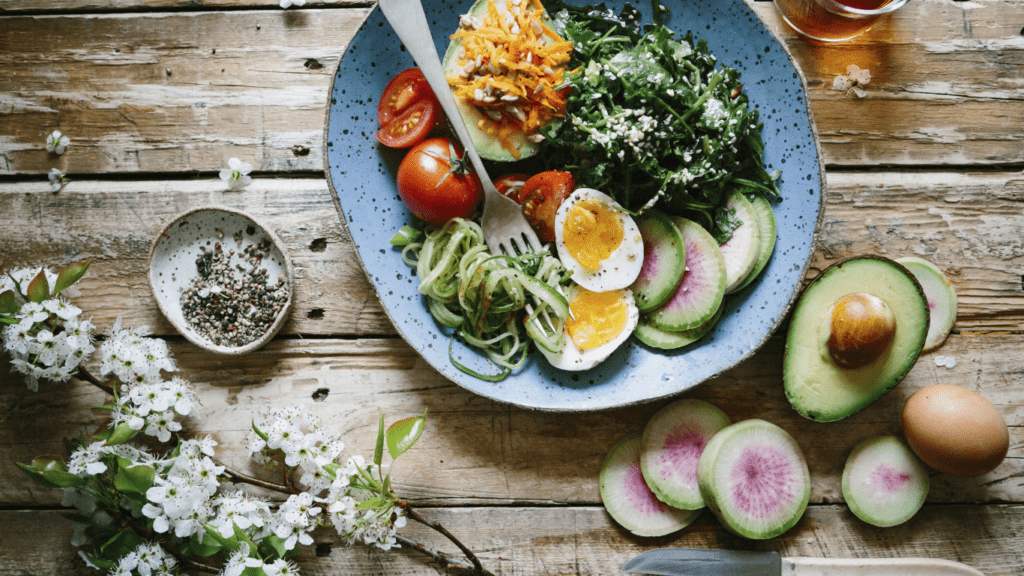As a salad enthusiast, I’ve always believed that salads are not just a side dish but a wholesome meal that can be enjoyed year-round.
In this article, I’ll delve into the world of nutrient-packed salads that are perfect for every season. From vibrant summer salads bursting with fresh produce to hearty winter bowls that provide comfort and warmth, there’s a salad for every palate and season.
I’ll share my favorite salad recipes that are not only delicious but also packed with essential nutrients to keep you energized and satisfied. Whether you’re looking for a light and refreshing option for a hot summer day or a cozy and nourishing bowl to combat the winter chill, these salads are versatile, flavorful, and easy to customize based on seasonal ingredients.
Join me on this culinary journey as we explore the endless possibilities of creating nutrient-packed salads for every season.
The Benefits of Nutrient-Packed Salads
Exploring the benefits of nutrient-packed salads is essential to understanding their value as a wholesome and satisfying meal option. Nutrient-packed salads offer a wide range of advantages that contribute to overall health and well-being. These benefits include:
- Nutrient Density: Nutrient-packed salads are a powerhouse of essential vitamins, minerals, and antioxidants. Incorporating a variety of colorful vegetables, fruits, lean proteins, and healthy fats into salads ensures a diverse range of nutrients crucial for optimal bodily functions.
- Weight Management: Including nutrient-packed salads in your diet can support weight management efforts. Salads are low in calories but high in fiber, which helps promote a feeling of fullness and prevents overeating. They are a healthy option for those looking to maintain or achieve a healthy weight.
- Hydration: Many salad ingredients, such as cucumbers, tomatoes, and leafy greens, have high water content, contributing to overall hydration levels. Staying hydrated is essential for various bodily functions, including digestion, circulation, and temperature regulation.
- Digestive Health: Fiber-rich ingredients like leafy greens, vegetables, and whole grains in salads promote digestive health by supporting regular bowel movements and a healthy gut microbiome. A healthy gut is crucial for nutrient absorption and overall well-being.
- Antioxidant Boost: Antioxidants found in ingredients like berries, nuts, and seeds in salads help combat oxidative stress and inflammation in the body. Including these ingredients regularly can enhance overall health and reduce the risk of chronic diseases.
- Heart Health: Nutrient-packed salads can contribute to heart health due to their rich content of heart-healthy ingredients like leafy greens, avocado, olive oil, and nuts. These ingredients support cardiovascular function and can help lower cholesterol levels.
- Energy and Vitality: Consuming nutrient-packed salads provides a steady source of energy and essential nutrients that support overall vitality. Fueling your body with nutrient-dense foods can enhance focus, productivity, and overall well-being.
By incorporating nutrient-packed salads into your meal rotation, you can enjoy a wide array of benefits that promote health, vitality, and satisfaction. Whether you’re aiming to manage your weight, boost your energy levels, or simply nourish your body with essential nutrients, nutrient-packed salads are a versatile and delicious option for every season.
Seasonal Ingredients to Include in Your Salads
Spring
In spring, I love adding fresh, vibrant ingredients to my salads. Incorporating nutrient-dense leafy greens like spinach and arugula provides essential vitamins and minerals to boost overall health. Adding colorful fruits such as strawberries and avocados not only enhances the flavor but also offers a dose of antioxidants that support immune function.
Summer
For summer salads, I recommend including hydrating ingredients like cucumbers and watermelon to combat the heat. Fresh herbs like basil and mint add a burst of flavor without excess calories. Grilling vegetables like zucchini and corn can bring a smoky depth to your salads, perfect for those summer barbecues.
Fall
As temperatures cool in fall, hearty ingredients like roasted squash and sweet potatoes can make your salads more satisfying. Nuts and seeds such as walnuts and pumpkin seeds provide a crunchy texture and healthy fats. Incorporating seasonal produce like apples and pears adds a touch of sweetness and fiber to keep you feeling full.
Winter
In winter, I enjoy warming up my salads with roasted vegetables like cauliflower and brussels sprouts. Citrus fruits like oranges and grapefruits bring a refreshing contrast to heavier winter dishes. Including grains such as quinoa or farro can provide a comforting element to winter salads, making them a comforting and nutritious choice during the cold months.
Ways to Enhance Nutrient Absorption in Salads
To maximize the nutritional benefits of salads, I focus on incorporating ingredients that enhance the absorption of key nutrients. Pairing specific foods together can help my body absorb essential vitamins and minerals effectively. Here are some ways to ensure optimal nutrient absorption in salads:
- Include Healthy Fats: Adding sources of healthy fats like avocado, nuts, and seeds to my salads can enhance the absorption of fat-soluble vitamins like vitamins A, D, E, and K. These nutrients are crucial for various bodily functions, and incorporating healthy fats helps me absorb them efficiently.
- Add Vitamin C-Rich Foods: Including vitamin C-rich foods such as citrus fruits, bell peppers, and berries in my salads can improve the absorption of iron from plant-based sources like leafy greens and legumes. Vitamin C helps convert iron into a form that is more easily absorbed by the body, making it an essential nutrient booster.
- Pair Iron-Rich Foods with Vitamin C: Combining iron-rich foods like spinach, lentils, and quinoa with vitamin C sources like tomatoes or oranges in my salads is a smart way to optimize iron absorption. This pairing is particularly beneficial for individuals following a vegetarian or vegan diet, ensuring they get an adequate intake of this essential mineral.
- Opt for Cooked Veggies: While salads are often associated with raw vegetables, including some cooked vegetables like roasted sweet potatoes or sautéed mushrooms can enhance the bioavailability of certain nutrients. Cooking can break down the cell walls of plants, making nutrients more accessible for absorption.
- Sprinkle Some Pepper: Adding a dash of black pepper to salads can boost the absorption of curcumin, the active compound in turmeric known for its anti-inflammatory properties. Piperine, a compound found in black pepper, can increase the bioavailability of curcumin, making it more effective in providing health benefits.
By incorporating these strategies into my salad preparation, I can ensure that my body absorbs the maximum amount of nutrients from every bite. Making mindful choices about ingredient combinations can significantly enhance the nutritional value of salads and support my overall health and well-being.
Tips for Storing Salad Ingredients
When preparing salads with fresh, nutrient-packed ingredients, proper storage is key to maintaining their freshness and maximizing their nutritional value. Here are some essential tips for storing salad ingredients to keep them fresh and flavorful:
- Leafy Greens: Store leafy greens like spinach, kale, and lettuce in the refrigerator crisper drawer. To prevent wilting, wrap them in a paper towel before placing them in a plastic bag.
- Fresh Herbs: Trim the ends of fresh herbs like cilantro, parsley, and mint, and place them in a glass of water like a bouquet. Cover the herbs loosely with a plastic bag and store them in the refrigerator.
- Vegetables: Keep chopped vegetables like bell peppers, cucumbers, and carrots in airtight containers in the refrigerator to maintain their crispness. For maximum freshness, avoid cutting them too far in advance.
- Fruits: Store fruits such as berries, apples, and citrus fruits in the refrigerator to preserve their flavor and nutrients. If slicing fruits in advance, drizzle them with lemon juice to prevent browning.
- Proteins and Grains: Cooked proteins like grilled chicken or hard-boiled eggs should be stored separately from salad greens to prevent sogginess. Similarly, store grains like quinoa or brown rice in separate containers to maintain their texture.
- Dressing: Store homemade dressings in airtight containers in the refrigerator. Shake well before using to ensure the flavors are well combined. Consider storing dressings separately from the salad ingredients until ready to serve.
By following these tips for storing salad ingredients, you can ensure that your salads stay fresh, vibrant, and packed with nutrients, ready to enjoy at any time during the day or week.



 Food Travel Writer
Suzette is the adventurous spirit of the team, exploring culinary landscapes around the globe. Her love for food and travel inspires her to create engaging guides that highlight local cuisines and hidden gems. Through her writing, Suzette takes readers on a journey, encouraging them to discover new flavors and cultures while savoring their meals.
Food Travel Writer
Suzette is the adventurous spirit of the team, exploring culinary landscapes around the globe. Her love for food and travel inspires her to create engaging guides that highlight local cuisines and hidden gems. Through her writing, Suzette takes readers on a journey, encouraging them to discover new flavors and cultures while savoring their meals.
